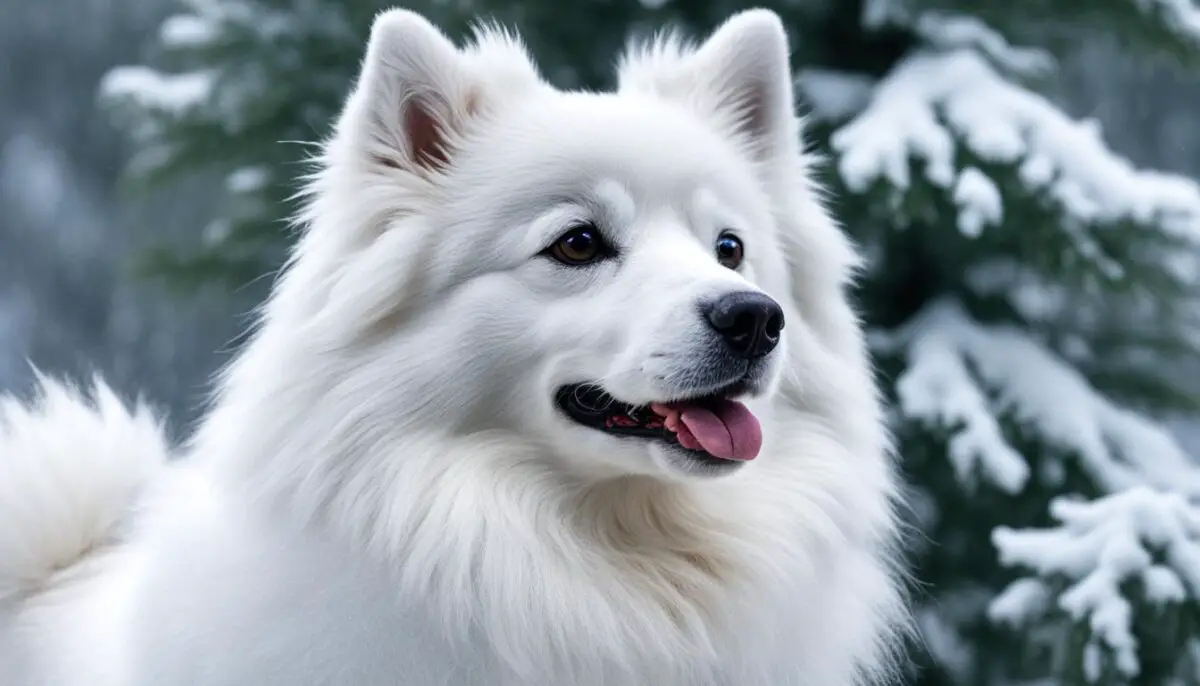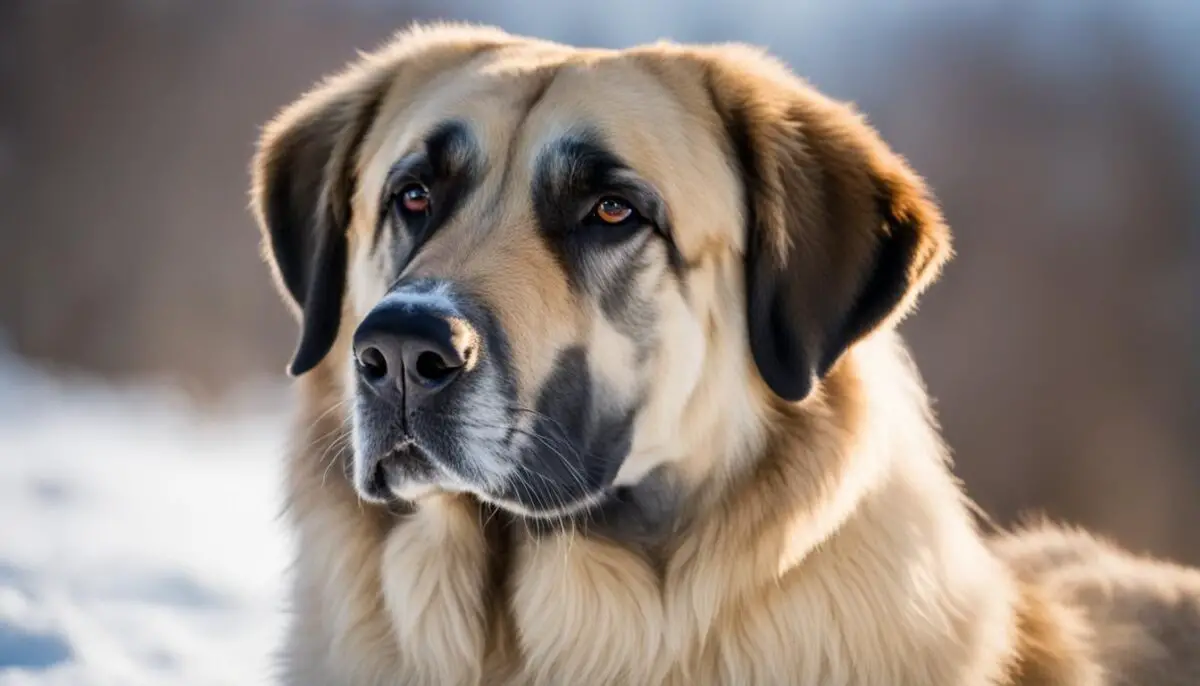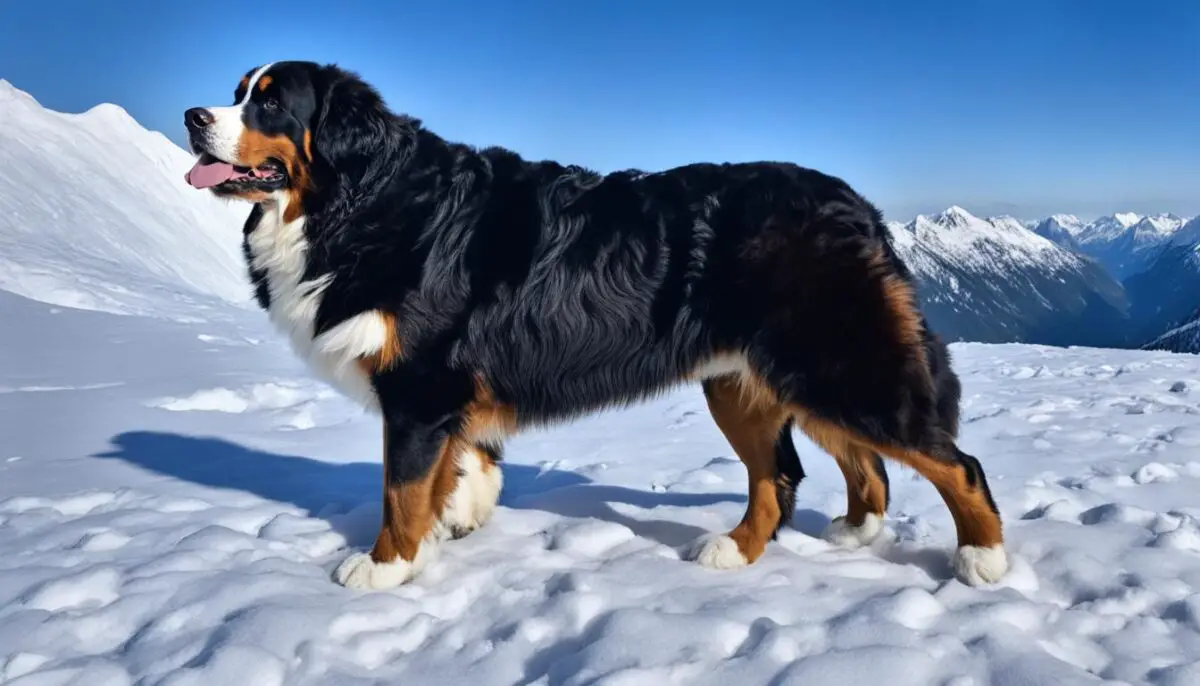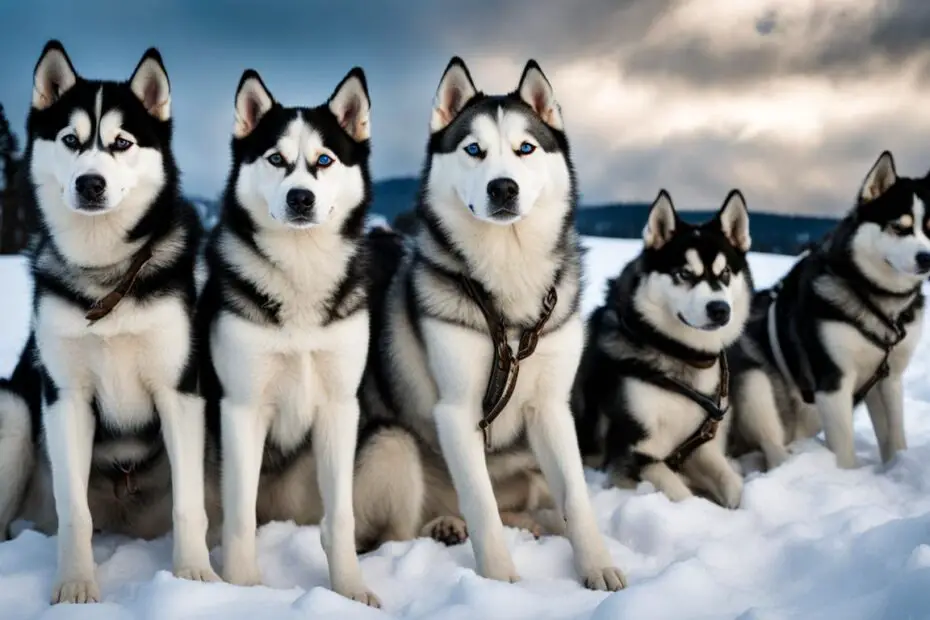From snowy landscapes to freezing temperatures, living in a cold climate can be both beautiful and challenging. If you’re a dog owner in search of a four-legged companion that can thrive in winter’s embrace, it’s essential to find a breed that is well-equipped for cold weather. Dogs with dense coats, sturdy paws, and a natural inclination for chilly climates are best suited to handle freezing temperatures and icy terrain.
When selecting a dog breed for cold weather, it’s important to consider various factors such as their coat density, adaptability to freezing temperatures, and ability to handle snowy environments. In this article, we will explore some of the best dog breeds for cold weather based on factual data from various sources.
But before we dive into the specifics, let’s take a moment to appreciate the remarkable beauty of these cold-weather canines. Take a look at the image below to catch a glimpse of these incredible dogs in their element.
Now, let’s explore the best dog breeds known for their ability to thrive in cold climates.
Key Takeaways:
- Dogs with dense coats and sturdy paws are best equipped to handle freezing temperatures and icy terrain in cold climates.
- The Akita, Alaskan Malamute, Bernese Mountain Dog, and Great Pyrenees are examples of dog breeds that excel in cold weather.
- Each dog is an individual, and their specific needs and preferences should be taken into account when considering their suitability for cold weather.
- Consider the coat density, paws, and overall adaptability to freezing temperatures when choosing a dog breed for cold weather.
- Always ensure you provide appropriate shelter, nutrition, and care for your dog in cold weather conditions.
Akita
The Akita is a breed that originated in Japan and was once owned by the Imperial family. This magnificent dog has a dense undercoat and a harsh outer coat, which make it well-adapted to cold weather conditions. The Akita is known for its strength and endurance, making it an ideal cold-weather hunting companion.
Despite its independent nature, the Akita is also extremely loyal and devoted to its family. This breed’s protective instincts make it an excellent choice for those seeking a loyal and trustworthy companion. With their strong and sturdy build, Akitas can handle the toughest of terrains and harshest of climates.
| Traits | Description |
|---|---|
| Coat | The Akita has a dense undercoat and harsh outer coat, offering exceptional protection against the cold. |
| Temperament | Akitas are independent and can be stubborn at times. However, they are known for their loyalty and protective nature towards their family members. |
| Size | Male Akitas typically weigh between 100 to 130 pounds, while females weigh around 70 to 100 pounds. |
| Exercise Needs | Akitas require moderate exercise to stay healthy and happy. Daily walks and interactive playtime are essential for their well-being. |

| Characteristic | Description |
|---|---|
| Size | Toy, Miniature, and Standard |
| Coat | Double coat; thick and dense undercoat with longer outer coat |
| Color | White, cream, or biscuit |
| Temperament | Intelligent, alert, playful, and friendly |
| Exercise Needs | Moderate; regular walks and playtime |
| Trainability | Highly trainable and eager to please |
American Eskimo Dogs have a rich history in the United States. They were often seen performing in the famous Barnum and Bailey Circus during the early 20th century, showcasing their intelligence and agility to captivated audiences.
The American Eskimo Dog is a stunning breed with a beautiful white coat that glistens against the winter landscape. Their playful and friendly nature, combined with their resilience to cold temperatures, makes them an excellent choice for those seeking a cold-weather companion.
Anatolian Shepherd
The Anatolian Shepherd is a remarkable dog breed that excels in mountainous terrains. With their rugged and tough nature, Anatolian Shepherds are well-equipped to handle challenging environments. Originating from Turkey, these dogs were initially bred as flock guards, protecting livestock from predators.
What sets the Anatolian Shepherd apart is its low-energy nature. While they may not be as active as some other dog breeds, they exhibit a strong protective instinct. Owners need to establish dominance from the beginning as these dogs can be wary of strangers. However, they are typically welcoming to individuals introduced by their owner.

With their protective nature and low energy levels, Anatolian Shepherds make excellent companions for those seeking a loyal and dependable guardian for their flock or family. Their rugged and tough demeanor, coupled with their ability to adapt to different conditions, makes them highly suitable for rough and challenging landscapes.
Bernese Mountain Dog
The Bernese Mountain Dog is a breed known for its strength, agility, and gentle temperament. This sturdy and large breed was originally bred in Switzerland as a drafting and driving dog. Bernese Mountain Dogs are capable of carrying their own gear and excel in activities that require physical endurance. They have a dense double coat that keeps them warm in cold climates, making them well-suited for snowy and mountainous regions.
Physical Characteristics
The Bernese Mountain Dog is a sturdy and large breed, with males typically weighing between 80 and 115 pounds, and females weighing between 70 and 95 pounds. They have a distinctive tricolor coat, with a black base, white markings on the chest, face, and tail, and rust-colored accents. The breed has a broad chest, deep body, and strong musculature, which contributes to their physical power and endurance.
Working Abilities
Bernese Mountain Dogs were historically used as drafting and driving dogs to assist farmers in the Swiss Alps. They are strong enough to pull carts filled with farm produce, making them invaluable working partners. These dogs are known for their strength, which allows them to navigate challenging terrains and carry heavy loads. Their agility makes them efficient workers, capable of maneuvering through tight spaces and adapting to diverse tasks.
Despite their working origins, Bernese Mountain Dogs have a gentle and friendly nature, which endears them to families as beloved companions. They have a natural instinct to protect their loved ones, making them excellent watchdogs. Their patient and calm demeanor also makes them great with children and other pets when properly socialized.
Bernese Mountain Dog Infographic
| Traits | Description |
|---|---|
| Size | Sturdy and large |
| Coat | Dense double coat for insulation |
| Temperament | Gentle, friendly, and loyal |
| Working Abilities | Strength, agility, drafting and driving |
| Weight | Male: 80-115 pounds, Female: 70-95 pounds |
| Life Expectancy | 6-8 years |
Image

Chow Chow
The Chow Chow breed is beloved for its unique features and cold-weather tolerance. With its distinctive black tongue and dense wooly coat, the Chow Chow is a true winter warrior. These dogs are built for the great outdoors, thriving in cold temperatures and delighting in winter adventures with their humans. Whether it’s exploring snowy landscapes or simply enjoying a brisk walk, Chow Chows are always up for outdoor activities even in the harshest of climates.
What sets the Chow Chow apart is its incredible adaptability to cold temperatures. Their thick double coat acts as insulation, keeping them warm and protected from freezing temperatures. Whether they are walking, running, or playing, Chow Chows have no problem braving the cold. Their wooly coats do require regular grooming to maintain their optimal condition, but the effort is well worth it for these majestic companions.
Aside from their physical attributes, Chow Chows are also renowned for their independent yet loyal nature. They have a calm and dignified demeanor that makes them an ideal companion for cold-weather enthusiasts. With their black tongues, wooly coats, and innate tolerance to cold temperatures, Chow Chows are the perfect furry friends for those who love the outdoors, even in winter.
German Shepherd
The German Shepherd is a versatile and highly intelligent breed that has captured the hearts of dog lovers worldwide. Originally developed in Germany for herding livestock, German Shepherds have proven their prowess in a variety of roles, including guarding, police work, and search and rescue operations. Their strong and agile bodies allow them to excel in physically demanding tasks, making them ideal for tasks that require strength, speed, and agility.
German Shepherds are known for their unwavering loyalty and protective instincts. They form strong bonds with their owners and are fiercely devoted to their families. Their natural instinct to protect makes them excellent guardians, both of property and of their loved ones. With proper training and socialization, German Shepherds can be well-mannered and friendly while still being vigilant and protective.
It is important to note that German Shepherds are prone to certain health issues, one of the most common being hip dysplasia. This is a genetic condition that affects the hip joints, causing pain and mobility issues. To mitigate the risk of hip dysplasia and other potential health problems, it is crucial to obtain a German Shepherd from a reputable breeder who focuses on breeding for good hip health.
| German Shepherd Characteristics | Description |
|---|---|
| Size | Medium to large |
| Coat | Double coat, dense and medium length |
| Temperament | Loyal, intelligent, protective |
| Exercise Needs | High |
| Health Concerns | Hip dysplasia, degenerative myelopathy, bloat |
German Shepherds require regular exercise and mental stimulation to keep them happy and healthy. They thrive in active households where they can be given plenty of opportunities to expend their energy. Without proper outlets for their energy, they may become bored or restless, which can lead to behavioral issues.
The German Shepherd’s versatility and strong working drive have made it a favorite breed for various roles, from herding and guarding to police work and search and rescue. Their intelligence and trainability have made them indispensable in these demanding fields, where their agility and strength allow them to excel. However, it’s important to remember that German Shepherds require commitment and dedication from their owners. With the right care, they can be incredibly loyal and loving companions.
Greater Swiss Mountain Dog
The Greater Swiss Mountain Dog, also known as the Swissy, is a breed that originated in Switzerland. They were originally used as draft dogs, working alongside farmers to pull heavy loads and carts. With their large and powerful stature, Swissies are well-suited for laborious tasks in harsh conditions.
Despite their size and strength, Greater Swiss Mountain Dogs are known for their gentle and friendly attitude. They have a calm and patient demeanor, making them excellent family dogs and companions. Swissies are particularly good with children and get along well with other pets.
While they are a powerful breed, Greater Swiss Mountain Dogs have moderate exercise needs. They enjoy daily walks, moderate play sessions, and engaging in activities such as hiking and backpacking. However, they are not overly demanding in terms of physical exercise, making them suitable for owners who may not have an active lifestyle.
One notable characteristic of the Greater Swiss Mountain Dog is their thick double coat, which provides insulation and protection against cold weather. This makes them well-equipped to handle snowy climates and winter conditions. Their coat requires regular brushing to maintain its health and appearance.
If you are considering a Greater Swiss Mountain Dog as a pet, it’s important to remember their large size. Adult Swissies typically weigh between 85 to 140 pounds, with males being larger than females. They require enough space and a comfortable living environment to accommodate their size.
Overall, the Greater Swiss Mountain Dog is a loyal and devoted breed with a gentle nature. They are well-suited for cold weather climates and are capable of participating in various activities. Whether as a working companion or a loving family pet, the Swissy is a wonderful addition to any household.
| Characteristics | Description |
|---|---|
| Size | Large |
| Weight | 85 – 140 pounds |
| Coat | Thick double coat |
| Exercise Needs | Moderate |
| Temperament | Gentle, friendly, patient |
| Original Purpose | Draft dog |
Great Pyrenees
The Great Pyrenees is a majestic and elegant breed that originates from France. These dogs were originally developed to herd livestock on steep mountain slopes. Known for their calm and gentle demeanor, they are considered the gentlest among the guarding breeds. Great Pyrenees are highly regarded for their loyalty, making them excellent family companions and guardians.
One of the defining features of the Great Pyrenees is their thick double coat, which provides them with exceptional insulation and protection in extreme cold temperatures. Their coat is weather-resistant, enabling them to withstand harsh winter conditions. Whether it’s snow or freezing winds, these dogs are well-prepared for the harshest of winter weather.
Great Pyrenees are relatively easy to care for. Though their beautiful coat may require regular grooming to prevent matting, their calm temperament and low exercise needs make them suitable for various lifestyles, including those in colder climates. They enjoy spending time outdoors, especially in wintertime, and are content to relax and watch over their surroundings.
By nature, the Great Pyrenees is a protective breed. Their guarding instincts, combined with their intelligence and alertness, make them excellent watchdogs. With proper training and socialization, they can adapt well to their environment and interact appropriately with other animals and people.
| Traits | Description |
|---|---|
| Origin | France |
| Size | Large |
| Temperament | Gentle, Calm, Protective |
| Coat | Thick double coat that provides insulation |
| Exercise Needs | Low |
| Training | Intelligent and responsive to training |
It’s important to note that Great Pyrenees may have their own independent streak, which requires consistent training and positive reinforcement. Early socialization is essential to ensure they grow up to be well-rounded and well-behaved dogs.
In conclusion, if you’re looking for a dog that can effortlessly handle cold weather and possess an elegant and calm personality, the Great Pyrenees is an excellent choice. Their gentle nature, combined with their thick double coat, makes them well-suited for snowy climates and the great outdoors. Whether you live in the mountains or countryside, this majestic breed will be a loyal and loving companion that will keep you warm in the coldest of winters.
Conclusion
When it comes to finding the perfect dog breed for cold weather, factors like coat density, paw structure, and adaptability to freezing temperatures are crucial. In this article, we have highlighted a few breeds that excel in cold climates, including the Akita, Alaskan Malamute, Bernese Mountain Dog, and Great Pyrenees. These dogs have the necessary traits, such as thick coats and robust physiques, to thrive in snowy and icy conditions.
However, it’s important to remember that every dog is unique, and individual needs and preferences should always be taken into consideration. While these breeds are well-suited for cold weather, it’s essential to provide proper care, ample exercise, and adequate shelter to ensure their well-being during winter months.
So, before making a decision, conduct thorough research and consult with reputable breeders or professionals to find the best dog breed for your specific cold weather requirements. Remember, a happy and healthy furry companion can make winter all the more enjoyable for both of you.
FAQ
What are the best dog breeds for cold weather?
Some of the best dog breeds for cold weather include the Akita, Alaskan Malamute, Bernese Mountain Dog, and Great Pyrenees.
What makes the Akita well-suited for cold weather?
The Akita has a dense undercoat and a harsh outer coat, which helps it withstand freezing temperatures. They are also known for their loyalty and protective nature.
What makes the Alaskan Malamute suitable for cold weather?
The Alaskan Malamute has a thick and coarse coat that provides excellent insulation in cold weather. They are bred for hauling heavy loads and have great strength and endurance.
Is the American Eskimo Dog a good breed for cold climates?
Despite its name, the American Eskimo Dog is not directly related to Eskimos. However, this breed has a white coat that resists soaking and thick ears that stay warm in low temperatures. They can withstand cold temperatures and are better suited for outdoor activities.
What are the characteristics of an Anatolian Shepherd?
The Anatolian Shepherd is a serious mountain dog with a rugged and tough nature. They were originally used as flock guards in Turkey and have low energy levels. They can be protective and wary of strangers, so it’s important for owners to establish dominance.
What makes the Bernese Mountain Dog suitable for cold climates?
The Bernese Mountain Dog is known for its strength, speed, and agility. They have a sturdy and large frame, making them capable of carrying their own gear. They are well-suited for cold weather and excel in activities such as hiking and herding.
Can Chow Chows tolerate cold temperatures?
Yes, Chow Chows are known for their thick, wooly coats and are extremely tolerant to cold temperatures. They love being outdoors with their humans and thrive in cold weather.
Are German Shepherds suitable for cold climates?
German Shepherds are known for their herding, guarding, and police work. While they are strong and agile, they commonly suffer from hip dysplasia. It’s important to buy from a reputable breeder if you are considering this breed for cold climates.
What are the characteristics of a Greater Swiss Mountain Dog?
The Greater Swiss Mountain Dog, also known as the Swissy, was originally used as a draft dog. They have a gentle attitude and moderate exercise needs. They are well-suited for cold weather and are capable of activities such as hiking and carting.
Can Great Pyrenees withstand cold temperatures?
Yes, Great Pyrenees are known for their thick double coat, which helps them withstand extreme cold temperatures. They are calm and gentle, making them easy to care for and perfect for winter weather.
